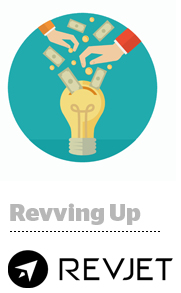
RevJet wants to be an operating system for the customer experience, and it’s using a $21 million Series A round to get there.
Total funding for the four-year-old startup, which helps marketers manage, test and optimize their digital advertising across touchpoints, is now $30 million.
The round, revealed Wednesday, was led by private equity firm Nautic Partners and is earmarked for investments in product and engineering, with a focus on AI, machine learning and personalization. RevJet, which has more than tripled its headcount since 2015 to nearly 100, is also planning to hire sales, marketing and customer success employees.
“There’s been a tremendous amount of technology built around media – the buying of media, the selling of media, targeting, pricing – but the actual marketing experience, what the customer sees, that’s been missing,” said Mitchell Weisman, CEO and founder of RevJet, whose clients include Bridgestone, Microsoft, LendingTree and Swisscom.
When RevJet first came out of stealth in 2015, it focused on measurement, ad orchestration and creative testing. It’s since evolved to include experience management a la Adobe Marketing Cloud and ad-serving capabilities along the lines of DoubleClick.
RevJet also provides more than 60 applications through an app exchange that provide additional services like audience building or creative optimization. Although the pricing is a SaaS model and clients need to sign up for the whole caboodle, they can install individual apps a la carte as needed.
“If you’re really going to orchestrate the customer experience in a modern way, it requires dozens of applications that are purpose built to power different use cases and work beautifully together,” Weisman said.
But advertiser clients have also been asking RevJet for technology that orchestrates the buyer journey and makes recommendations on how to optimize messaging, which is where artificial intelligence comes in.
The RevJet product road map includes a tool tentatively dubbed “Robo Ops” to help marketers automate the doldrums of operational tactics, an automated QA function and campaign simulation software.
Automation is a requisite for smart marketing. When certain tasks can be automated, “all of a sudden, other things are possible,” Weisman said.
“In many respects, with all of the data and technology out there, it should be this golden age of marketing right now, but it’s almost too much,” he said. “Each and every impression could have half a dozen or more different technologies and stakeholders involved. Crafting and delivering meaningful user experiences across every touch point is a big challenge, but it’s what we’ve set ourselves to go after.”
This post was syndicated from Ad Exchanger.


More Stories
The Spinoff’s three part podcast to analyse NZ media
Veteran Anchor Darla Montgomery to Retire from KLFY
Macca’s NZ celebrates community connections